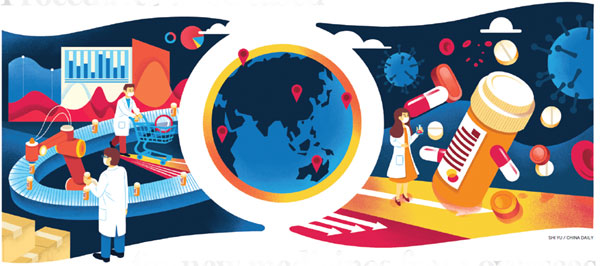Procedures to be eased for new medicines from overseas


Approval measures will be simplified, especially for treatment of serious diseases and illness, within a matter of months
The approval process will be eased for new medicines from overseas, especially for those treating rare diseases and life-threatening ailments.
A State Council executive meeting, presided over by Premier Li Keqiang on Wednesday, decided to further simplify approval procedures for imported drugs, reduce prices for anti-cancer drugs and strengthen work to secure the supply of desperately-needed medicines.
A slew of measures will be taken to make approvals easier for medicines to cure rare diseases and life-threatening illnesses, a statement released after the meeting said.
Approval procedures should be completed in three months for rare-disease medicines and six months for those to help combat life-threatening illnesses. Meanwhile, prices for anti-cancer medicines will be reduced following the zero-tariff policy adopted last month. An alert system for precautions against supply shortages will be further enhanced, and drug reserves will be substantially expanded.
The decision made at the meeting will allow new drugs that are already sold in overseas markets to be used on the Chinese mainland. The meeting was the latest move following the zero-tariff policy for anti-cancer drugs and the central government's encouragement of medical innovation.
This is an urgent matter closely related to people's well-being and administrative streamlining in the pharmaceutical industry, Li said at Wednesday's meeting. Therefore, all related government departments should prioritize it and help make high-quality medicines widely available and affordable in China, he said.
Issues such as rare-disease medications should top the government's agenda and an adequate supply of medicine should be guaranteed, Li said.
Simplified approvals will see China no longer lag behind many countries in introducing new medicines, said Chen Yuming, a public health professor at Sun Yat-sen University in Guangzhou, capital of Guangdong province.
Among 415 new medicines approved for sale in developed economies over the past 10 years, 76 have been approved to be sold in China and another 201 are in the stage of clinical trials and applications, according to the National Drug Administration of China.
For medicines that have been sold in overseas markets for rare and life-threatening diseases, the time to enter the Chinese market can be shortened by one to two years when no ethnical differences are found, said Jiao Hong, head of the National Drug Administration of China, at a policy briefing on Friday hosted by the State Council Information Office. No clinical trials will be required for these medicines and experimental data collected in other countries can be used for applications, she said.
"For medicines treating rare diseases, AIDS and cancers, we will accelerate the administrative approvals to shorten the time by one or two years for them to be sold in the Chinese market and meet the demands of Chinese patients," Jiao said.
In October last year, the former China Food and Drug Administration lifted the restriction that applications must be submitted in China after new medicines are already sold in the country of origin. The move will encourage synchronous sales of new medicines developed in overseas markets, the CFDA said.
Since April, imported chemical pharmaceuticals are no longer tested in trading ports but are randomly checked on the market by the authorities.
Reforms like these have resulted in increasing numbers of medical innovations and new medicines, said Wang Lifeng, director of the administration's department of cosmetics registration management. Taking chemical pharmaceutical products as an example, the number of innovative medicines increased by 66 percent year-on-year in 2017 to 149, he said.
For some medicines that are in urgent need, the approval process should be accelerated, which will reduce costs for pharmaceutical companies and financial burdens for patients, Chen at Sun Yat-sen University said.
However, the use of medicines must be based on time-consuming clinical trials and ethnical differences must be taken into consideration, he said. In addition, compliance oversight should be strengthened by training professionals to check medicines available on the market, he added.
- Geminid meteor shower seen across China
- Sustainable agriculture in focus at Hainan forum
- Road accident in East China kills 4
- Health Bureau: Free Chinese medicine services for Tai Po fire victims
- Satellite launch marks a new milestone in UAE-China cooperation
- HK fire: 4,510 residents in shelters as support fund reaches HK$3.6b




































